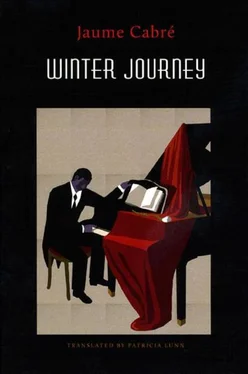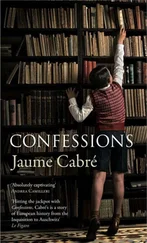A whole day inside this dovecote full of bird shit and dead pigeons and a filthy, absurd stink, with an additional problem, which is that 1 have to bend over all the time and sometimes 1 stand up without thinking and smack myself on the back of the head, which 1 think is bleeding. But the thing is that the magical and camouflaged opening to the Holy Dovecote is directly across from my target. It's the Lord's will and for that reason I've baptized this Sacred Dovecote with the name of Truth, though some call it Here and Now. Another defect of the Sacred Dovecote is that it's fucking hot inside. But if to find this perfect hiding place it was Lord's Will that first I had to neutralize the doorman of the building, who rudely and insultingly insisted on knowing where 1 was going with that shotgun, the fact that the find has had to overcome these obstacles makes it even more valuable in the eyes of God, in the eyes of Humanity, in the eyes of History. 1 can hardly move and every once in a while my legs cramp, but 1 praise the Lord for showing me the Site and for being able to ignore the inconvenience first with absent lovers, absent lovers, absent lovers, a cassette tape with nothing on it but Neal, Jack, Me, and now the seventh and last variation of Fischer the Saint, which will be with me until God says Enough… Hey, look, finally, shit! 1 chose right! God finally said Enough; what I've been waiting for for eighteen minutes and twenty-nine seconds: after so much trouble, finally, nosy Jane has stuck her head out, all jittery. She just couldn't wait. I'm not going to give her a second chance. Okay, be still, honey. Done. 1 just hung a well-deserved red medal over her heart. I hope her gum won't end up in the wrong place, poor thing. Honesta mors turpi vita potior. Amen.
I'm going to try and include everybody in the cast, oh Barcelona friends, especially Bosnians, the homeless, Norwegians, old people and Communists. I'll be here as long as 1 can stand it and the sweat doesn't make me close my eyes. And I'll set aside the last bullet, to erase my memory book Here and Now. 1 already said it a minute ago when 1 began this Second Epistle: horresco referens.

 orka stopped smiling when they took away the only thing she loved, her son, a hulking boy in his twenties who still drooled and who hadn't been able to learn to read because of the twisted connection between his eyes and his head. But he was good enough to go to war and they took him.
orka stopped smiling when they took away the only thing she loved, her son, a hulking boy in his twenties who still drooled and who hadn't been able to learn to read because of the twisted connection between his eyes and his head. But he was good enough to go to war and they took him.
Zorka often thought about her Vlada and she would cry bitterly when she imagined a thousand bullets piercing his empty head, or godless and soulless soldiers making fun of him because he was always smiling and showing the unpleasant hole in his mouth. Zorka got into the habit of sitting in the dining room, the cloth with the crowded flowers spread over the table, her hands on top of it, her gaze fixed on some spot of light, letting the hours go by remembering her son's idiot giggle. One afternoon her memory got away from her and she thought about Vlada's infancy, before anyone could say that he was a little short on words and ideas, and she still hoped to bring up a normal child. And her thoughts went even farther back, to the first days she'd lived alone, because a runaway horse had killed Petar, the admirable Petar Stokovic, the strongest man in the village, and life had left her pregnant with Vlada and open-mouthed in astonishment. And she remembered the time when, still a maiden, she was the pretty girl from the Black House and her dour brothers managed the property as best they could and she asked nothing else of life. Zorka of the Black House remembered these happy things to forget, for at least a few instants, her sorrow over Vlada's laugh, which grew sillier and sillier as time went by. And in this way Zorka's days seemed shorter.
As time went by and her thoughts were so much in the past, she forgot to talk with people and started living on wine and salt cod so as not to have to cook, not to have to do anything, to have more time to meditate on the son taken away by godless and fatherless soldiers. Every day, she would go out in the middle of the afternoon, raising dust by dragging her tired feet beyond the last houses to contemplate the road down which they'd taken him. And she would stay there until the end of the day, when the shadows grew long and people started saying, There's Zorka, it's time to start thinking about supper. And the neighbor women didn't dare make conversation because her glance had grown so sour.
The Black House had always been a silent place, as if the walls could foresee and remember the death that would shortly befall them. That's why the neighbor women failed to hear Zorka whimpering at the table, and they wondered more than once what that poor woman was doing shut up like that, and crossed themselves thinking how she could take the blows of life like a stone, feeding on the bitterness of her tears. And Zorka spent hours motionless at the table until the day when exactly three months had gone by since they took her son, and she wanted to cry very hard, to give vent to the rage that had built up in her for ninety days. And so her neighbors couldn't hear, she put her head in the oven and howled half the night until she collapsed.
When people started to say that the gunfire was getting closer and started to see rotting bodies floating down the Rzav, Zorka tried to draw strength from her desolation, and right at noon she would go to the Ice Bridge and sit on a stone by the bank to watch the hours and the dead go by in the river that, when she was little, had produced carp and pleasure. At first she watched anxiously, in case she might recognize her son, but what she did was imagine the dark death in the eyes of the drowned and she waved goodbye to them and said, Goodbye, my children, why have you killed one another when just moments ago you were playing hide-and-seek, and they didn't answer her, though some of them looked at her with fear still on their faces. And now, standing at their doors, people said, Look, Zorka's going to the river, poor woman, it's already time for dinner. And they said, May Almighty God have mercy on her, and they went inside, because since the Rzav had started to carry bodies there was a curfew in the village after noon.
One day, Zorka ran into a gang of soldiers who were heavily armed but dirty and ragged, unshaven from days in the forest, and looking for trouble. They told her rudely that she couldn't be out at that hour, or any hour, that they were in charge. And because she looked at them vacantly and said nothing, the corporal warned her that nobody messed with him, and he had orders to shoot anything that moved, including cats and dogs. She paid them no mind and went on towards the river, because it was noon and she had to go see her dead pass by. The corporal called to her again and his shouts echoed off the walls of the houses and pierced the ears of the terrified neighbors. Zorka, as if listening to the wind blow, kept on, dragging her feet and raising dust. The corporal swore and barked out the order to fire; the godless and soulless soldiers hesitated as they watched her walk away, and one of them thought, This isn't right, it isn't right, she's just a crazy old lady. The corporal repeated the order, his voice hoarse with rage. Then one of the soldiers put his rifle to his shoulder, a magnificent FR5o that before the war some lucky man had used to hunt boar, fixed the woman's back in the telescopic sight, and fired. Zorka of the Black House fell like an abandoned sack of clothes. The soldier went up to her, pleased with his marksmanship, looked at her amazed, raised his head and shouted.
Читать дальше


 orka stopped smiling when they took away the only thing she loved, her son, a hulking boy in his twenties who still drooled and who hadn't been able to learn to read because of the twisted connection between his eyes and his head. But he was good enough to go to war and they took him.
orka stopped smiling when they took away the only thing she loved, her son, a hulking boy in his twenties who still drooled and who hadn't been able to learn to read because of the twisted connection between his eyes and his head. But he was good enough to go to war and they took him.










